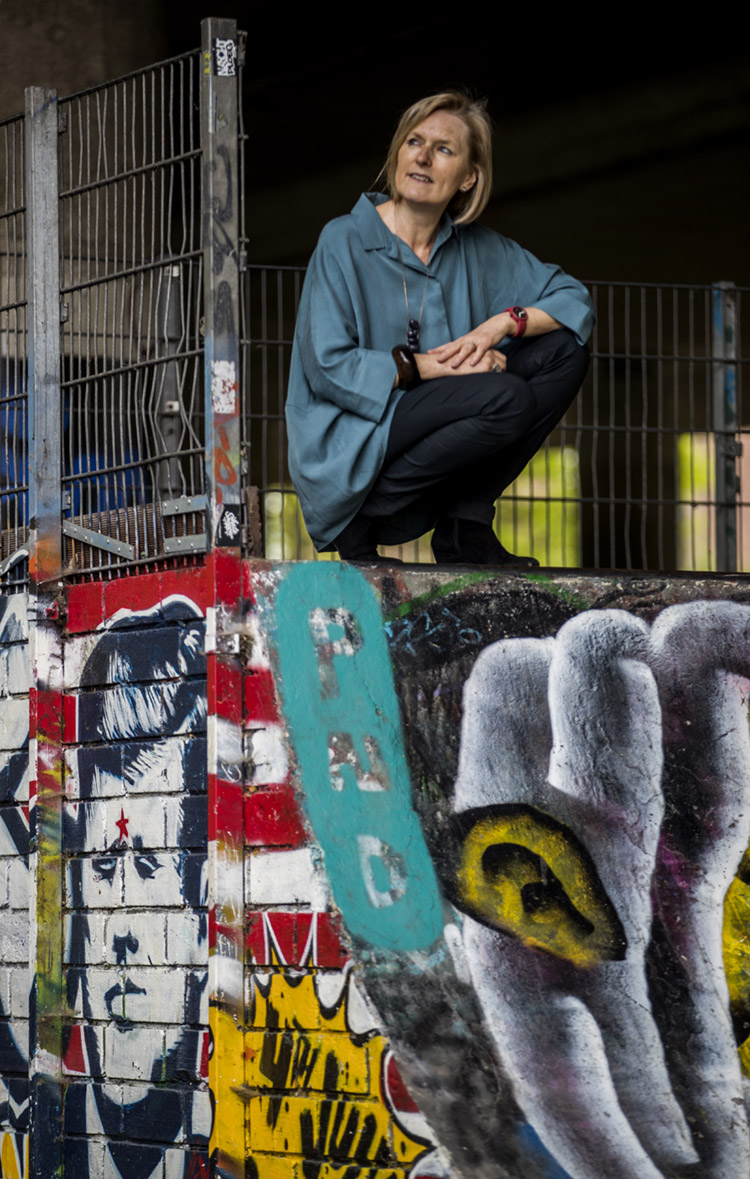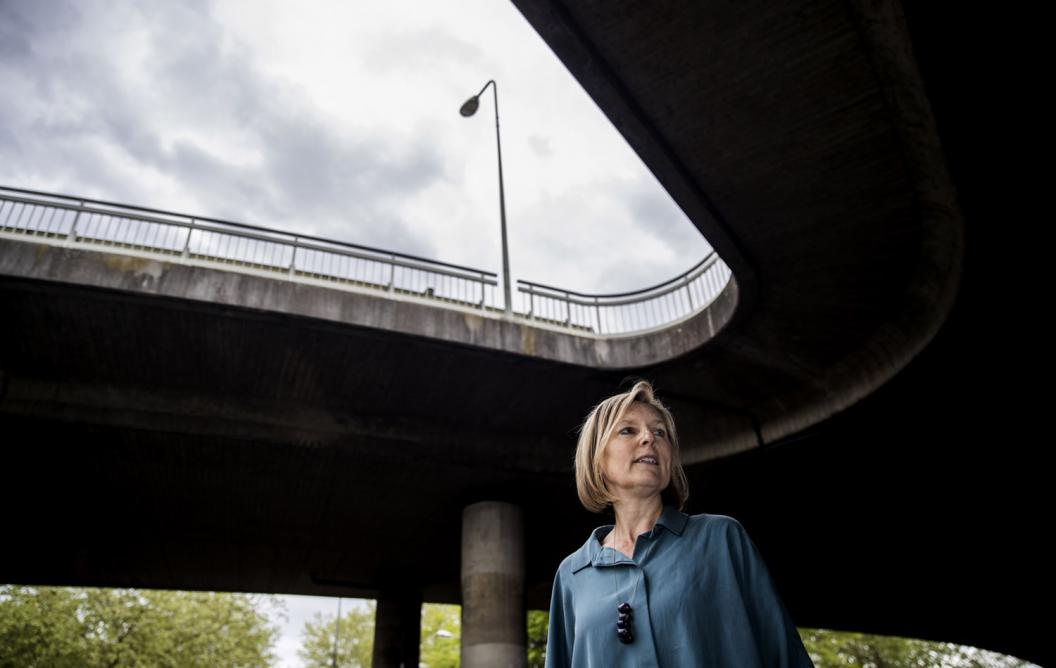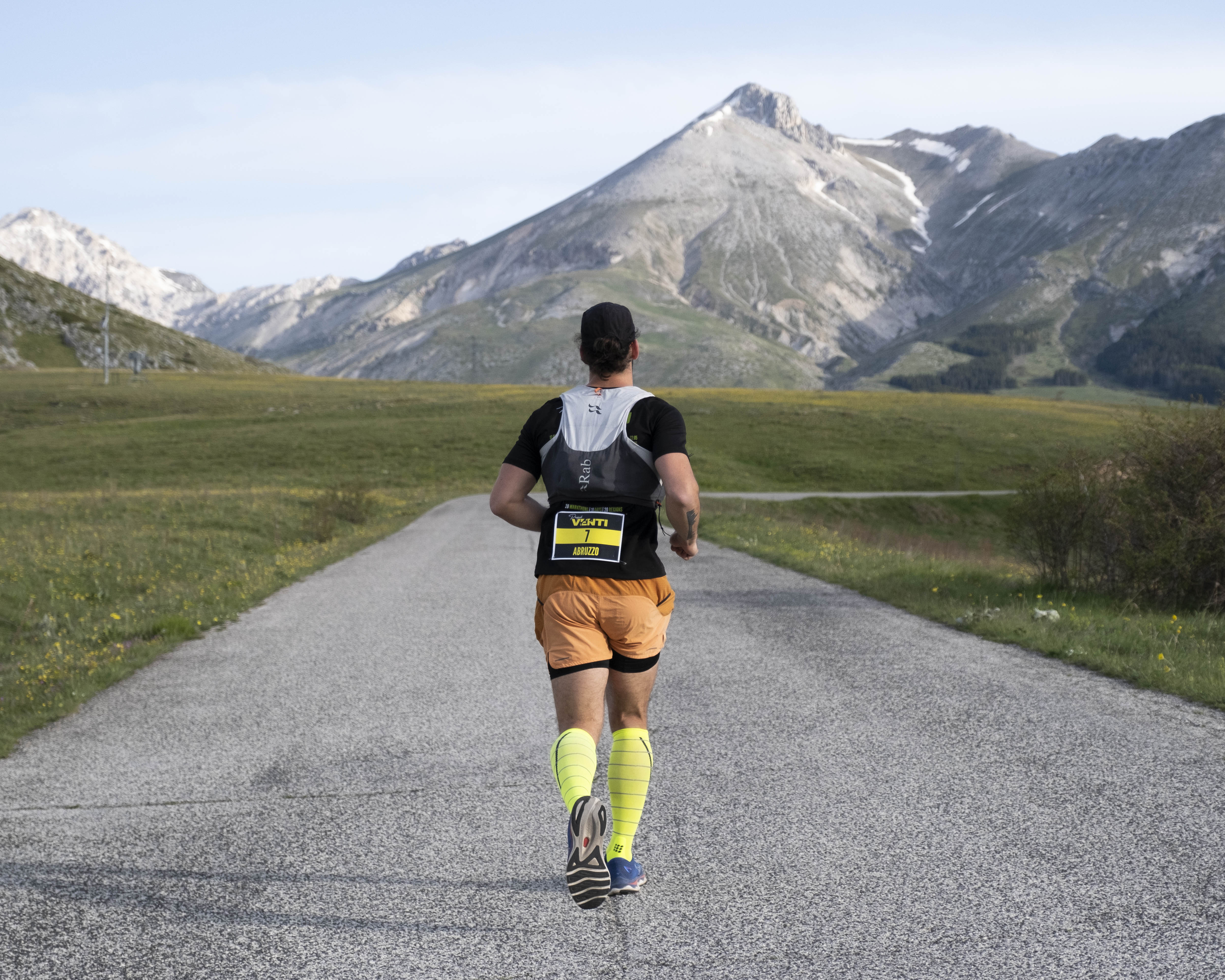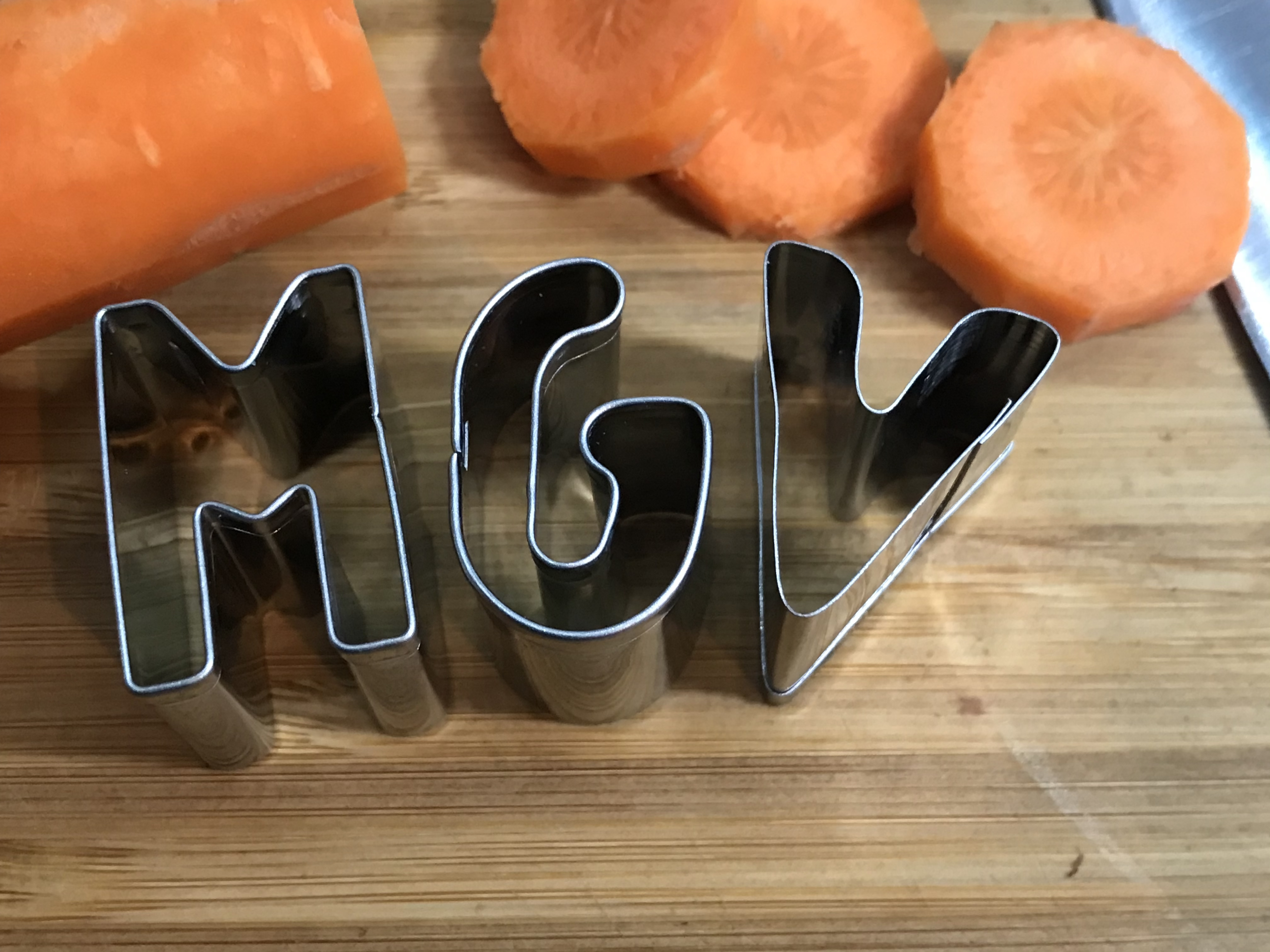“Europe keeps me up at night, not my job”
She’s a political scientist and an art enthusiast. She loves chocolate, just like her father and grandfather. She’s ‘secretly’ ambitious, like her son. A ‘Dutchified’ Belgian, a team player, a sound sleeper and a good listener. “I don’t mind talking about myself if I’m asked. But most people like to do the talking.” A report of a two-hour interview with Sophie Vanhoonacker, dean of the Faculty of Arts and Social Sciences.
She would have laughed had someone told her, 20 years ago, that she would become a professor. She was just doing her job. Sure, she was giving 120%, but more because of her upbringing than out of ambition. Although…
Born and raised in Bruges
“The nuns at my all-girls school in Bruges taught us to work hard. If we slacked off they’d say, ‘Aren’t you ashamed of yourself?’ This must have contributed to my work ethic, which I also share with my sister. Her husband always says we give 120%. Cutting corners wouldn’t feel good to me. It’s something my parents taught us, too.”
Sophie is the eldest child. Her sister is a manager at the Royal Museum of Fine Arts in Brussels and her brother, who married an Englishwoman, is head of the Belgian-Luxembourg Chamber of Commerce in Great Britain. Their parents instilled in them an interest in art and history from an early age. “My mother was a museum tour guide and my father was a dentist who spent his spare time digging through archives to write articles on the history of Bruges. Going to museums was their hobby, and they’d take us kids along with them.” Incidentally, her father’s line of work didn’t mean sweets were off-limits. “He had a real sweet tooth himself; there were always lots of biscuits in the house. But afterwards we had to eat an apple to clean our teeth.” Her grandfather, she recalls, ate so many sweets he developed health problems.
In love with Europe
In high school, Vanhoonacker developed a keen interest in history and contemporary international politics. She considered studying political science. “But I decided against it; it didn’t have a great reputation at the time. History appealed to me as well because of the wide range of subjects and the fact that you could specialise in contemporary history.” In her final year, she attended a lecture by a member of the European Parliament – and so began her love affair with Europe. “I’d already had a poke around the library of the College of Europe in Bruges. I was really taken by it, all those students of so many different nationalities.”

Sophie Vanhoonacker has been professor of Administrative Governance in the EU and dean of the Faculty of Arts and Social Sciences since 2016. The faculty is celebrating its 25th anniversary this year.

She started studying European Studies there in 1984, just before the signing of the Single European Act. “It was like a revival of Europe, a kind of positive flow of renewed attention to European integration that would benefit me throughout my career.” She was fascinated by the idea of cross-border cooperation. Her parents had always encouraged curiosity about other cultures, literature, languages, cuisines. But the concept of Europe as a peace project also appealed to her imagination.
Research in Maastricht
For a long time, she didn’t know what she would do after her studies. “I didn’t want to teach history at high school; that seemed too limiting.” Someone pointed her to the European Institute of Public Administration (EIPA) in Maastricht, and she wound up as assistant to the Greek academic Panos Tsakaloyannis, who specialised in European foreign and security policy. Vanhoonacker’s many different tasks included providing training courses for high-ranking officials of member states that would assume the presidency of the Council of the European Union. She organised conferences and did research. “This was before the internet; it was a less stressful time. You showed up at the office in the morning and he’d say, ‘What shall we do today? You know what, why don’t you read a few articles about this topic.’ I published my first articles under his supervision.”
She enjoyed doing research and soon realised that, if she wanted to pursue academia, she’d have to do a PhD. And so she did: as an external PhD candidate at Leiden University, in addition to her work at EIPA, partly during her holidays. “I didn’t have a clear picture of where I wanted to go, but I was preparing for a possible next step.”
Opportunities at UM
That next step presented itself in 2001, when she was hired for one of the vacancies at UM in connection with the new bachelor’s programme in European Studies. She loved being part of the complementary team responsible for establishing this unique programme. “The timing was right. Europe was growing and thriving, the prospects for students were good.” She didn’t even notice that there were no female professors in the faculty. As a student, she’d never had a female lecturer either. “We didn’t know any better.” Her predecessor as dean created a number of chairs for talented women, and Vanhoonacker was one of them. She was given five years to prove herself on a number of criteria, and her first thought was: will I be able to do all that? “By working towards those goals, you surpass your own expectations.”
Two years after her appointment, she became head of the Political Science department. That’s where she discovered the importance of human resources; in her view, HR can either make or break a department. Then, in 2016, she accepted the position of dean – though not without hesitation. “I was afraid I’d miss my research.” Although she felt a certain sense of duty, she realised this wouldn’t be enough to sustain her for four years. So she turned for advice to people she considers wise, as she always does before making an important decision. The deciding factor: “Someone said to me, ‘You can make the position your own’.”
People manager
She runs the faculty in close consultation with others; her fellow board members or other experts, external ones if necessary. When it came to deciding on the direction of the faculty’s latest bachelor’s programme, together with Jessica Mesman (vice dean of education) and Kiran Patel (vice dean of research) she put out an open call for suggestions. After extensive study and deliberation, they decided on Digital Society. Working with a collegial board, she never feels lonely at the top. “On the contrary, I feel very supported.”
As a people manager who pays close attention to ‘the person behind the colleague’, she understands that not all of her decisions make everyone happy. “As dean you have to think of the organisation. I don’t lose sleep over it, maybe because I’m too tired”, she laughs. “But mainly because I try to do everything as honestly and transparently as possible.” She is empathetic and not quick to anger. She is said to be able to show her teeth if need be, although few have witnessed it first-hand. This makes her laugh. “If I get the sense someone is taking advantage of me, I tell them on no uncertain terms that they’re crossing the line. I never have to repeat myself.”
A career driven by duty
She doesn’t talk much about work at home, even though her husband – professor of architecture at the University of Liège and a former dean – is no stranger to the subject matter. “My sounding board is at the faculty.” The fact that her husband spent a long time studying, at home with their son Gil, gave her the freedom to focus on her career. “I was the breadwinner, which made me feel a certain duty to be ambitious.” Or perhaps it’s in her nature after all? “One of my son’s teachers once called him ‘secretly ambitious’. I thought: maybe I am, too. He’s a cool skater boy. He seems laidback, but at the same time he’s doing very well at University College Utrecht and staying on top of his work.” She was surprised by his independence from an early age. When, aged 12, he took his bicycle and headed for the skate park full of 16-year-olds, he wouldn’t let her come with him. “I hid behind a tree to make sure nothing went wrong.”
Although she and her husband are Flemish, she says her son is ‘mostly Dutch’. She, too, has become more direct since moving here in 1987. She appreciates the international and open flavour of Dutch universities. “I’m not sure I’d easily be able to settle in Belgium again.” Then again, she doesn’t have to. She laughs heartily at the suggestion that, if her career trajectory continues to mirror the course of European development, she may have cause for concern. “At the moment, Europe keeps me up at night more often than my job does. But that’ll only make it even more interesting to return my research after I’m done as dean.”
Also read
-
As a toddler, Pieter du Plessis couldn’t stay away from the kitchen. He later entertained the idea of becoming a chef—until his dream faltered under the harsh light of reality. Now a PhD candidate at Maastricht University, he uses national dishes as a lens to examine South Africa’s past and identity...
-
Alumnus Alessandro Portante is running twenty marathons in twenty days across the twenty regions of his home country Italy, a challenge he calls Project Venti.
-
For a casual way to explore tasty plant-based cuisine in good company, you may want to check out Maastricht goes Vegan, a non-profit cooking event. Werner Teeling of the Faculty of Psychology and Neuroscience is one of the organisers.


